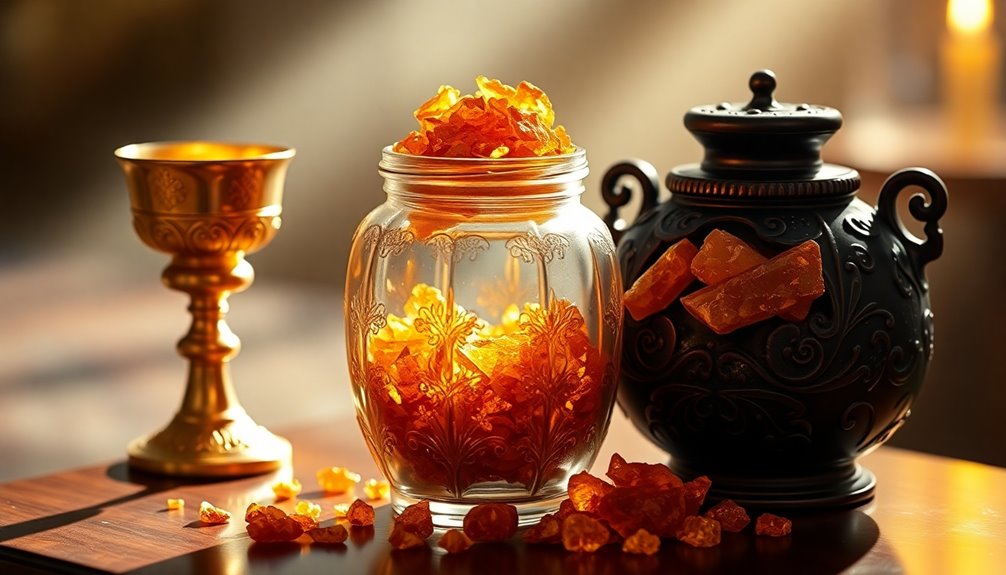Gold, frankincense, and myrrh represent profound symbols tied to Jesus' identity and mission. Gold signifies His kingship and royal authority, establishing Him as the King. Frankincense highlights His divinity and role as a priest, connecting to worship in the temple. Myrrh foreshadows His suffering and sacrifice, a powerful reminder of His future. These gifts also provided support for Mary, Joseph, and baby Jesus during their exile. Today, the significance of these gifts continues to echo in modern celebrations. Exploring further reveals even more about their cultural impact and lasting traditions.
Key Takeaways
- Gold symbolizes Jesus' kingship and authority, establishing His identity as the royal Messiah in biblical prophecies.
- Frankincense represents Jesus' divinity and priestly role, connecting Him to worship and the sacred rituals of the temple.
- Myrrh foreshadows Jesus' suffering and death, acknowledging His future sacrifice for humanity and the gravity of His mission.
- The gifts of the Magi provided financial support for the Holy Family during their exile, reflecting thoughtful selection for their well-being.
- These gifts continue to influence modern Christmas traditions, symbolizing honor, generosity, and community connection.
Introduction
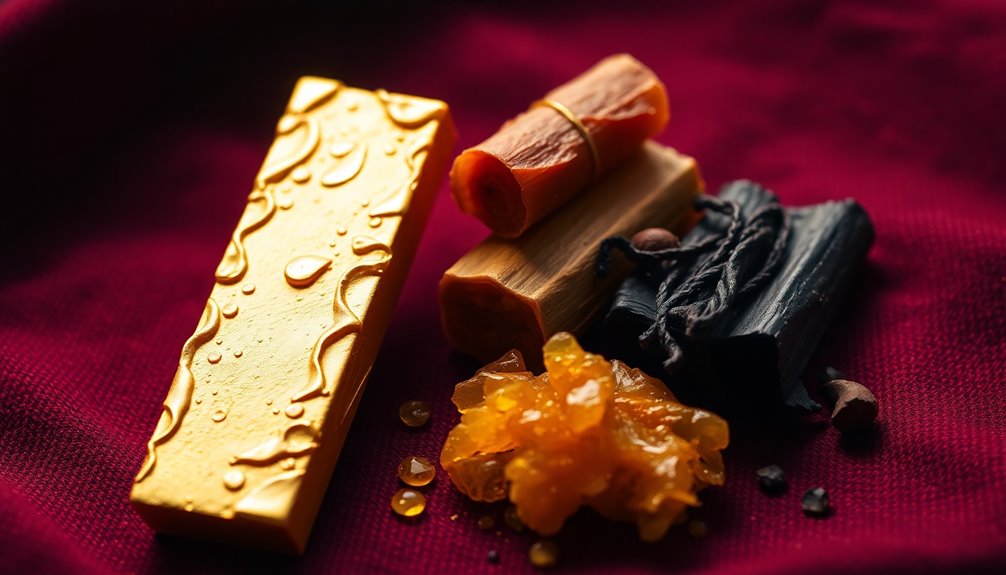
The significance of gold, frankincense, and myrrh transcends mere material value; these gifts embody profound meanings that resonate even today. When the Magi presented these offerings to Jesus shortly after his birth, they weren't just gifts but symbols rich in meaning.
Gold represents Jesus' kingship, reminding you of his royal status and authority. Frankincense, a fragrant resin, symbolizes his divinity and priestly role, emphasizing the spiritual connection between humanity and the divine. Then there's myrrh, which foreshadows Jesus' suffering and death, highlighting the sacrifice that lies ahead.
These gifts also served a practical purpose, providing financial support for Joseph, Mary, and Jesus during their escape to Egypt. This context reveals that the Magi, often depicted as wise men or kings with profound astronomical and spiritual knowledge, weren't just honoring Jesus; they were offering essential aid to his family in a time of need.
The cultural and theological implications of gold, frankincense, and myrrh continue to influence modern Christmas celebrations, reminding you of themes like honor, sacrifice, and the recognition of Jesus' identity that are at the heart of this season.
Biblical Significance of Gifts

When you explore the biblical significance of the gifts brought to Jesus, you'll find rich layers of meaning in each one.
Primary and secondary Bible references reveal how gold, frankincense, and myrrh not only honor Jesus' identity but also connect to ancient prophecies.
Understanding these gifts helps you appreciate their theological impact within the Christmas narrative.
Primary Bible References
Among the primary Bible references to the gifts of gold, frankincense, and myrrh, the Gospel of Matthew stands out as the most significant. In Matthew 2:11, the Magi present these gifts to the newborn Jesus, each carrying profound symbolism.
Gold represents Jesus as King, highlighting His royal status and fulfilling the tradition of valuable offerings in ancient cultures. Frankincense, used in worship, symbolizes His divine nature and role as the High Priest, emphasizing His holiness and righteousness.
Myrrh, on the other hand, is associated with embalming and suffering, foreshadowing Jesus' future passion and sacrifice. This aligns with Matthew 27:34, where myrrh is mentioned again, linking the gift to His impending death.
The gifts of the Magi not only honor Jesus but also fulfill prophecies regarding the Messiah. For instance, Isaiah 60:6 speaks of nations bringing gold and frankincense in reverence of the Lord.
In this way, the gifts of gold, frankincense, and myrrh reveal deep truths about Jesus' identity and mission, making the Gospel of Matthew a crucial reference for understanding their biblical significance.
Secondary Bible References
Understanding the significance of the gifts of gold, frankincense, and myrrh goes beyond their presentation in Matthew. These offerings illuminate crucial aspects of Jesus' birth and identity.
Gold, often associated with kingship, signifies Jesus as the divine King, reflecting His royal status and the wealth of His kingdom. Frankincense, commonly used in temple worship, highlights His holiness and sacrificial nature, representing His divine purpose in the salvation narrative.
The interpretations of the meaning of myrrh are particularly striking. Linked to embalming, myrrh foreshadows the suffering and affliction Jesus would endure throughout His life. These gifts don't merely serve as valuable offerings; they embody profound theological significance.
Moreover, the Magi's presentation of these gifts fulfills prophecies regarding the Messiah, emphasizing how even foreign dignitaries recognized Jesus' importance.
Each element contributes to a deeper understanding of His mission on Earth, encapsulating His kingship, divinity, and the suffering He'd eventually face. By examining these secondary Bible references, you can appreciate the layered meanings behind gold, frankincense, and myrrh, enriching your understanding of the nativity story.
Trade Routes of Antiquity
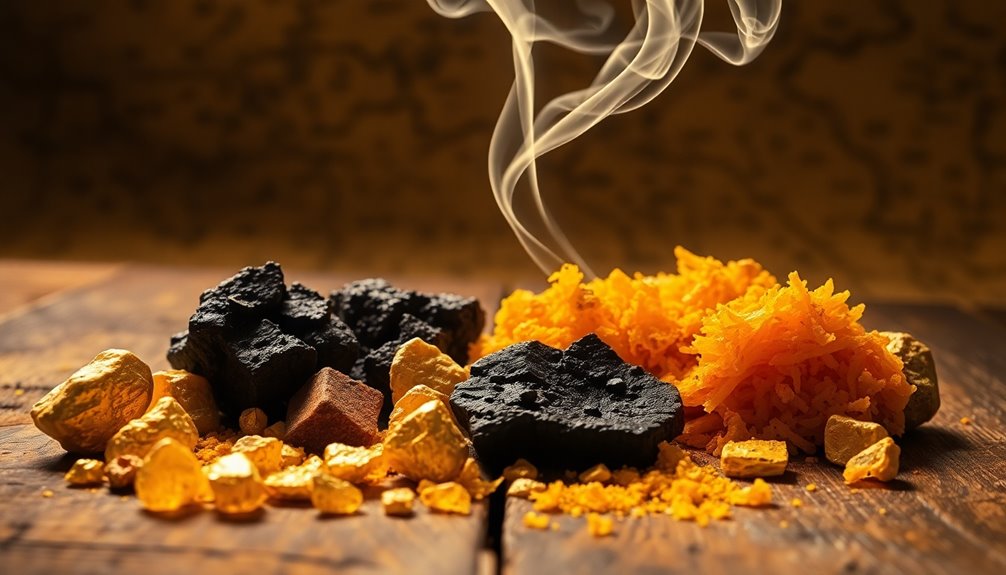
Trade routes of antiquity played a vital role in shaping the economies and cultures of ancient civilizations. You'd find that routes like the Silk Road connected the East and West, allowing for the exchange of valuable commodities such as gold, frankincense, and myrrh.
These trade routes linked regions like the Mediterranean to Asia, fostering economic growth and cultural exchange. The Incense Route, in particular, was crucial for transporting frankincense and myrrh from southern Arabia to the markets of the Roman Empire.
These luxury items were highly sought after, not just for their aromatic qualities but also for their use in religious rituals and medicinal practices. Gold, mined in places like Egypt and Nubia, also traveled along these routes, reinforcing its reputation as a symbol of wealth and power.
As you explore these ancient trade routes, you'll discover that they didn't just facilitate the movement of goods; they also encouraged the spread of ideas and cultural interactions among diverse civilizations.
The intricate web of trade connections laid the foundation for a rich tapestry of human history, influencing societies for centuries to come.
Symbolic Meanings of Gifts
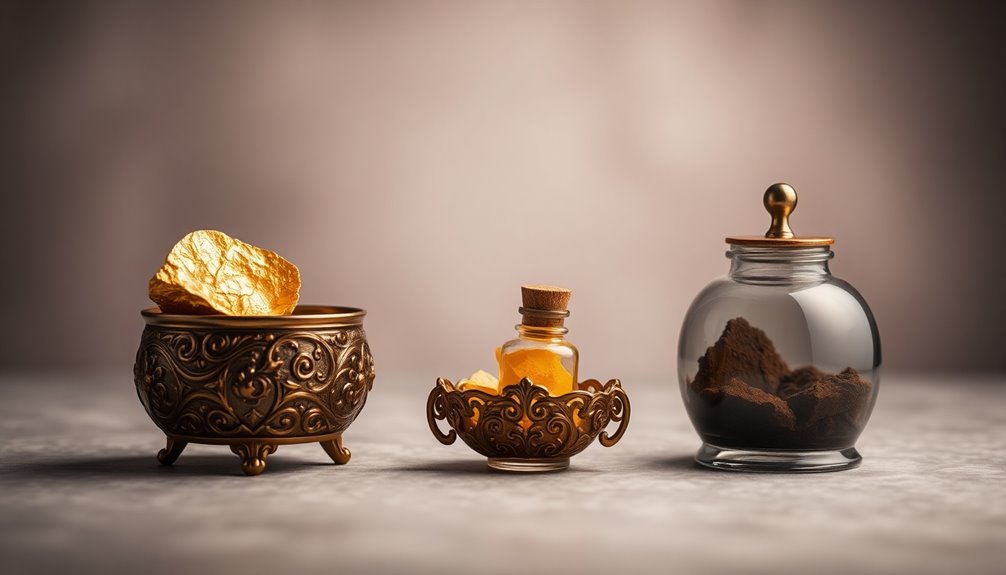
The gifts of gold, frankincense, and myrrh brought by the Magi to Jesus carry profound symbolic meanings that reflect His identity and mission. Gold symbolizes kingship and wealth, acknowledging Jesus as the divine King. This precious resource would later aid His family's survival during their exile to Egypt.
On the other hand, frankincense represents Jesus' priestly role and divinity. Traditionally used in temple worship and sacrifices, it indicates His deep connection to prayer and intercession.
Myrrh, however, foreshadows Jesus' suffering and death. Commonly associated with embalming practices, it symbolizes His future sacrifice for humanity. Together, these gifts reflect Jesus' roles as King, Priest, and Prophet, emphasizing the theological significance of His identity right from His birth.
The symbolic meanings of these gifts fulfill ancient prophecies regarding the Messiah, showcasing the Magi's recognition of Jesus' divine nature.
In presenting these gifts, the Magi highlight the multifaceted aspects of Jesus' mission on Earth, reminding us of the depth and richness behind each offering. Understanding these symbols deepens your appreciation for the story and the Savior they herald.
Magi's Gifts as Royal Tribute
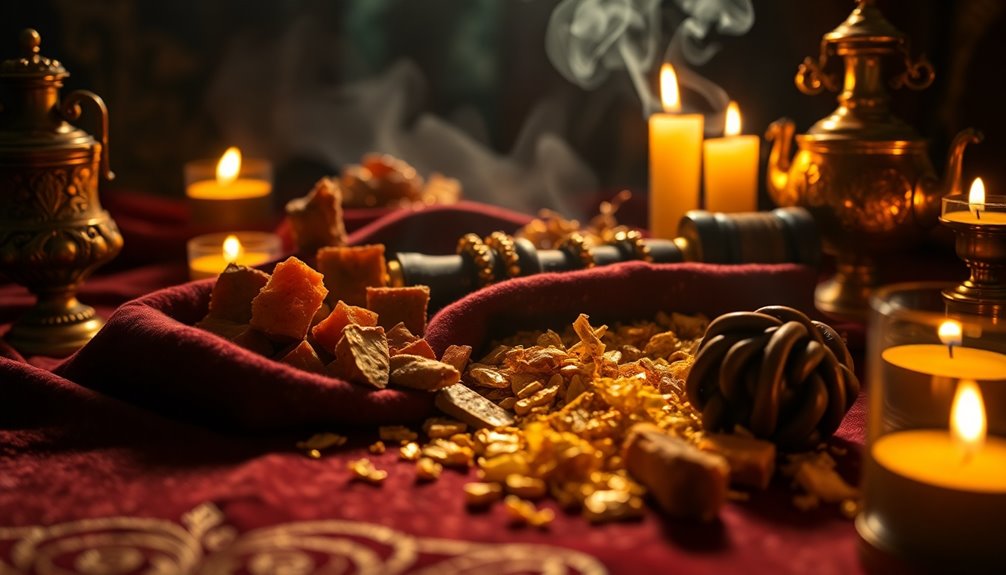
When you think about the Magi's gifts, it's easy to overlook their cultural significance and royal connotations.
Many misconceptions exist around the gifts' meanings, yet each item carries a profound message about Jesus' identity and purpose.
Understanding these gifts as royal tribute helps clarify their importance in the context of His life and mission.
Debunk Common Misconceptions
Often misunderstood, the gifts of gold, frankincense, and myrrh weren't merely royal tributes but symbolic offerings that highlighted Jesus' roles as King, Priest, and Prophet.
The three wise men, often mistakenly labeled as kings, actually served a more profound purpose in their visit. The biblical account doesn't specify their royal status or even how many there were, leaving room for assumptions shaped by cultural traditions.
These gifts served practical purposes that extended beyond ceremonial significance. Gold, while a traditional offering for royalty, provided essential financial resources for Joseph, Mary, and Jesus during their escape to Egypt. This underscores its importance in their survival, illustrating that the gifts weren't just a form of homage.
Frankincense and myrrh, known for their medicinal properties, also reflect the Magi's thoughtful selection. These gifts were chosen with care, demonstrating concern for the family's well-being rather than merely fulfilling a royal tribute.
Thus, the gifts of gold, frankincense, and myrrh were much more than symbolic offerings; they were practical aids that supported the Holy Family during a critical time.
Cultural Relevance of Gifts
Magi's gifts of gold, frankincense, and myrrh hold significant cultural relevance, acting as powerful symbols of Jesus' royal status and divine nature. Each gift was more than a mere offering; it represented a profound acknowledgment of who Jesus was.
Gold, revered for its wealth and power, signified Jesus' kingship. Traditionally offered to royalty, this precious metal established His rightful place among kings.
Frankincense, often used in temple rituals, symbolized divine worship and underscored Jesus' role as both King and Priest. This aromatic resin connected Him to the spiritual realm, highlighting His unique identity.
Myrrh, associated with embalming and suffering, foreshadowed Jesus' eventual sacrifice. This poignant gift not only acknowledged His future as Savior but also reinforced the gravity of His mission.
Together, these gifts served as a royal tribute while providing practical support for Joseph, Mary, and Jesus during their flight to Egypt.
The cultural relevance of gold, frankincense, and myrrh transcends mere material wealth; they encapsulate the recognition of Jesus' dual nature as both divine and human, making them a pivotal part of His story.
Gifts in Modern Celebrations

When you think about gift-giving traditions today, it's clear that the essence of gold, frankincense, and myrrh still resonates. You might find yourself participating in community gift exchanges that reflect the same spirit of honor and generosity. These practices not only strengthen bonds but also remind us of the deeper meaning behind our celebrations. Additionally, incorporating themed events into these traditions can enhance community engagement and foster social interaction.
Gift-Giving Traditions Today
Gift-giving during modern celebrations carries deep-rooted traditions that echo the ancient offerings made to honor significant figures. Just as the Magi presented their three gifts—gold, frankincense, and myrrh—to honor Jesus, you may find that your gifts today serve similar symbolic purposes. The gift of gold, a precious metal, symbolizes wealth and prosperity, reflecting the high value of thoughtful presents during the holiday season.
In contemporary celebrations, you often exchange gifts that carry deep meaning, whether they represent love, faith, or sacrifice. Luxury items, handcrafted creations, and unique experiences are popular choices, mirroring the thoughtfulness of the gifts once given to Jesus. These modern gifts emphasize generosity and goodwill, reinforcing the importance of community and connection during festive times. Additionally, understanding your financial obligations can enhance your ability to give meaningful gifts without compromising your financial health.
In various cultures, specific gifts may showcase local customs and beliefs, adding to the rich tapestry of gift-giving traditions worldwide. As you partake in these traditions, remember that every gift you choose continues a legacy of honor and respect, making your celebrations even more special.
Community Gift Exchange Practices
Modern celebrations often feature community gift exchanges that bring people together in a spirit of sharing and connection. These exchanges, held primarily during the holiday season, encourage you to share meaningful and thoughtful gifts, reminiscent of the Magi's offerings of gold, frankincense, and myrrh.
Many events emphasize honor and sacrifice, promoting the exchange of high-quality or handmade items that reflect deep appreciation. In various cultures, community gift exchanges often take the form of potluck-style gatherings where you contribute both gifts and food, fostering a strong sense of togetherness.
These events not only highlight the spirit of giving and gratitude but also mirror the Magi's intent to honor the newborn Jesus through charitable initiatives supporting local causes. Whether it's a Secret Santa or a white elephant exchange, each format promotes creativity and connection, similar to the diverse interpretations of the Magi's visit.
Gifts' Enduring Cultural Impact
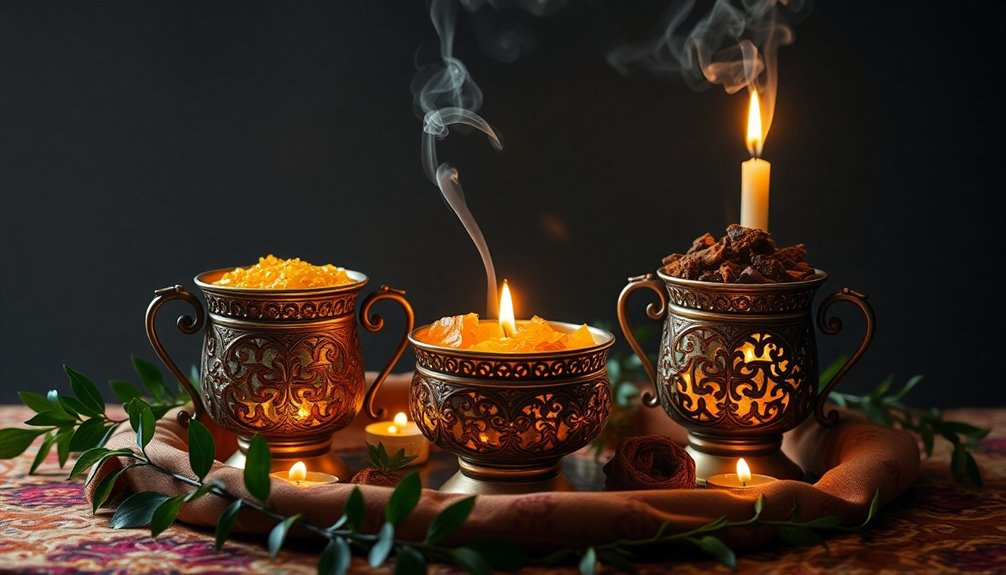
While the gifts of gold, frankincense, and myrrh may have originated in a specific historical context, their cultural impact continues to resonate deeply today. You'll find these gifts represented in nativity scenes and Christmas decorations, highlighting their enduring significance within Christmas traditions. The gold symbolizes royalty and honor, while frankincense reflects divinity, and myrrh foreshadows suffering.
The Magi brought these gifts, and their journey has inspired countless artistic interpretations, depicting them as wise men or kings in various forms of visual art and literature. This narrative has become a cornerstone in understanding the Nativity story, shaping sermons, hymns, and theological discussions.
Furthermore, the association of these gifts with the Magi has influenced customs like the celebration of Epiphany, which marks their visit and the revelation of Christ to the Gentiles.
Through these rituals and representations, the gifts continue to inspire reflection on themes of honor, divinity, and sacrifice. As you engage with these traditions, you're participating in a rich tapestry of culture that honors the profound significance of the Magi's offerings.
Additional Resources

Explore a variety of resources that delve into the rich symbolism and historical significance of gold, frankincense, and myrrh.
You can start by examining the Gospel of Matthew (2:11), where the Magi present these gifts to Jesus Christ, revealing their importance as symbols of His roles as King, Priest, and Prophet.
Books and articles focusing on ancient trade can provide context on how these valuable commodities were exchanged and their practical uses in supporting the Holy Family during their escape to Egypt.
Consider resources that analyze the theological implications of each gift—gold representing kingship, frankincense signifying divine worship, and myrrh foreshadowing suffering and death.
Documentaries and lectures on early Christian traditions will also enhance your understanding of how these gifts have shaped cultural and religious practices throughout history.
Online platforms like JSTOR or Google Scholar can lead you to academic papers that discuss the enduring impact of these gifts and their relevance in modern faith communities.
Frequently Asked Questions
What Is Gold, Frankincense, and Myrrh Used For?
Gold's primarily used as a symbol of wealth and investment, often seen in jewelry and artifacts.
Frankincense, derived from tree resin, is popular in perfumes and incense for its aromatic qualities, making it a staple in religious rituals.
Myrrh, another tree resin, is valued for its antiseptic and healing properties, often used in medicinal practices.
Together, they serve not just practical purposes but also hold deep symbolic significance in various cultures and traditions.
What Is the Meaning of Gold, Frankincense, and Myrrh to Jesus?
When you think about the significance of these three gifts, you see they each represent vital aspects of Jesus' identity.
Gold highlights His royal status and kingship, while frankincense symbolizes His divine nature and role as High Priest.
Myrrh, on the other hand, foreshadows His suffering and sacrificial death.
Together, these gifts acknowledge Jesus as a multifaceted figure, embodying the prophecies surrounding Him and providing insight into His mission on Earth.
What Is Myrrh in the Bible?
In the Bible, myrrh represents suffering and bitterness.
You'll find it mentioned as a valuable resin used for its antiseptic qualities.
It's tied to Jesus' life, symbolizing His future afflictions, particularly during His crucifixion when it was offered to Him mixed with wine.
Additionally, myrrh is part of the holy anointing oil, highlighting its significance in ancient rituals and its association with sanctification in the Jewish faith.
What Does Frankincense and Myrrh Do for the Body?
Frankincense and myrrh have several benefits for your body.
Frankincense may help relieve arthritis pain and reduce inflammation, while its calming aroma can promote relaxation and lower stress levels.
Myrrh, on the other hand, offers antiseptic properties, making it useful for oral health and wound healing.
Additionally, myrrh's analgesic qualities can provide pain relief.
Incorporating these substances into your wellness routine could enhance your overall well-being significantly.

